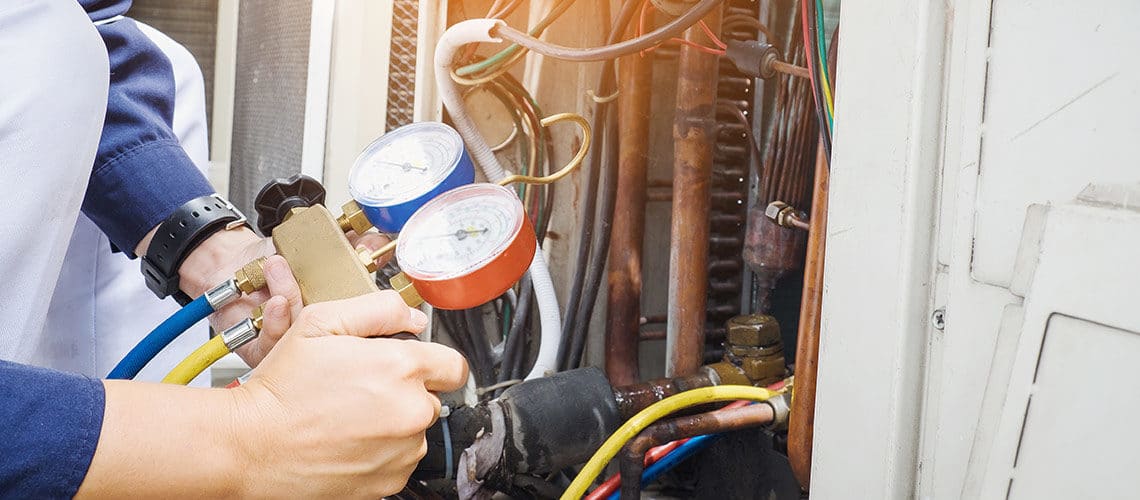Enhance Air Quality with DMAKS HVAC Professional Assistance.
Enhance Air Quality with DMAKS HVAC Professional Assistance.
Blog Article
Exactly How to Select the Right A/c System for Your Requirements
Picking the suitable cooling and heating system is an essential decision that calls for cautious consideration of numerous aspects. Begin by evaluating your home's size, design, and distinct needs, as these components dictate the needed ability and configuration of the system. Furthermore, developing a spending plan that encompasses setup and lasting functional costs is essential. As you consider your choices, comprehending energy performance ratings and the ramifications of your regional environment will certainly play a significant function in your choice. Nevertheless, the myriad of system types readily available can complicate this procedure, leading one to wonder which path inevitably leads to ideal comfort and performance.
Examine Your Home Size
Examining your home dimension is a crucial very first step in picking the ideal HVAC system. A Heating and cooling system that is also tiny will certainly battle to keep comfortable temperature levels, leading to increased energy consumption and wear on the system.
To properly assess your home size, gauge the square footage of each space, considering elements such as ceiling height and the format. Furthermore, consider the insulation quality and the variety of windows, as these elements affect thermal performance. Houses with open flooring plans may need different system configurations compared to those with many divided areas.
Making Use Of the Handbook J load calculation approach can supply a more specific quote of your cooling and heating needs. This method make up different factors, consisting of regional climate, solar gain, and occupancy patterns. By meticulously examining these aspects, you can make certain that your selected HVAC system is suitably sized, causing enhanced convenience, energy performance, and durability of the tools.
Determine Your Budget Plan
Determining your budget plan is a critical step in the a/c system selection procedure, as it establishes the specifications for your alternatives - DMAKS HVAC. A HVAC system is a considerable financial investment, and understanding your economic limits will help tighten down options that fit within your ways
Begin by evaluating not just the preliminary acquisition cost but also installation costs, which can vary significantly depending on the complexity of the project. Moreover, think about ongoing expenses such as maintenance, repairs, and power consumption. A system might appear affordable initially however can bring about greater expenses over time if it is less efficient.
It is suggested to assign a contingency fund for unanticipated expenditures that may emerge throughout setup or first system changes (DMAKS HVAC). Additionally, explore funding alternatives or refunds that may be readily available, as these can ease the concern of ahead of time prices
Eventually, having a clear budget enables you to involve with cooling and heating professionals extra efficiently, guaranteeing you obtain customized advice that aligns with your monetary goals and home requirements. By being attentive concerning your budget plan, you can make enlightened decisions that enhance convenience without jeopardizing monetary stability.
Evaluate Power Efficiency
Energy performance plays an important duty in the total performance and cost-effectiveness of your cooling and heating system. When choosing a system, it is vital to consider its energy effectiveness ratings, as these numbers straight affect your energy expenses and ecological footprint. Look for systems with a high Seasonal Power Efficiency Proportion (SEER) for cooling down and a high Yearly Gas Utilization Performance (AFUE) ranking for heating. Higher rankings indicate higher efficiency, meaning even more comfort for much less energy intake.
In addition, think about the Power Celebrity certification, which represents that the system meets rigid efficiency standards established by the Epa. Purchasing a Power Star-rated a/c system can cause considerable financial savings in time, especially in areas with extreme temperature level fluctuations.
An additional aspect to review is the system's size and ability. An extra-large or undersized unit can lead to ineffectiveness and boosted energy prices. DMAKS HVAC. Appropriate sizing, commonly identified via a Hand-operated J lots calculation, makes sure that the system runs at optimal performance


Consider Climate and Environment
When picking a heating and cooling system, it is critical to consider the local climate and ecological problems, as these factors dramatically influence the system's efficiency and efficiency. Different areas experience differing temperature level extremes, humidity degrees, and seasonal changes, every one of which effect home heating and cooling needs.

Furthermore, regional ecological factors, such as air top quality and prospective allergens, should notify your selection. Systems geared up with sophisticated filtration technologies can help minimize toxins and provide cleaner air. Additionally, consider the power resources available in your area-- some heating and cooling systems are extra reliable when powered by gas or renewable power sources.
Eventually, aligning your a/c system selection with your neighborhood environment and ecological considerations will certainly bring Visit Website about boosted comfort, enhanced effectiveness, and reduced energy costs.
Explore System Types and Features
As house owners look for to enhance convenience and effectiveness, checking out the numerous sorts of heating and cooling systems and their one-of-a-kind attributes ends up being necessary. The key types of HVAC systems consist of air conditioning, warmth pumps, ductless mini-split systems, and heaters. Each system provides distinct benefits tailored to various requirements and image source preferences.
Central air systems give uniform air conditioning throughout a home, making them ideal for bigger areas. Heatpump serve as both heating and cooling down solutions, using power to move warmth, which can cause lower power prices. Ductless mini-split systems are ending up being significantly prominent because of their adaptability and simplicity of setup, allowing house owners to control the temperature level in private rooms without substantial ductwork.

Verdict
To conclude, selecting the suitable cooling and heating system requires mindful factor to consider of various elements, including home size, budget plan restraints, power performance, neighborhood climate, and offered system kinds. A detailed assessment of these elements ensures optimal comfort and cost-effectiveness. By following a structured method, property owners can make informed decisions that align with their particular needs and preferences, ultimately leading to enhanced indoor air top quality and power savings.
Report this page